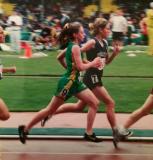Folders |
Running Issues With Elizabeth Carey: Sleep On ItPublished by
Why Shut-Eye Is Essential And How To Get It By Elizabeth Carey for DyeStat If there were a secret or perfect formula for becoming a better athlete (and human), it’d include one very important variable: sleep. Sleep is important for athletes because it rejuvenates and restores both body and mind. It encourages your muscles, bones, heart and other systems to adapt. It allows your brain to make new memories, improve cognition and boost moods. It plays a big role in keeping athletes healthy. For my book GIRLS RUNNING, I interviewed physical therapist Ellie Somers, DPT and USATF-certified running coach about reducing the risk of injury in teenage endurance athletes. “For young female runners, appropriate fueling and adequate sleep are probably the most important variables to reducing injury risk. Ironically, this has nothing to do with what exercises a person does, but rather with how they are recovering. And recovery isn’t about foam rolling, really; it’s about fuel and sleep and being able to shut your mind off.” The same goes for other athletic cohorts, including all track and field and cross country athletes — especially those in the midst of puberty. So, while training consistently and training hard are important keys to unlocking performance, they’re not the only ones. We know that sleep is awesome for us, makes us feel good, can boost cognitive and physical performance, and supports the tremendous growth and development of adolescence. Sounds like low-hanging fruit that you should be picking, right? Young athletes are too often pulled in infinite directions (school, teams, friends, work, training, competition, screens, family, etc.). Unfortunately, these competing interests too easily sacrifice sleep. Sleep is especially important in times of stress. Say, for example, in a global pandemic and movement for racial justice. Uncertainty and upheaval might leave your brain and nervous system churning; sleep provides rest and rejuvenation so you can better process what is going on and what you’re going to do about it. The finite constraints of your daily life likely look different now than, say, last year. In fact, for many teens, schedules have cleared. Without early first period times and after-school events, they’re able to listen to their night-owl circadian rhythms. Some have even gone nocturnal! Some are finally getting enough sleep. Most teenagers need approximately 10 hours of sleep a night. Adults? More like at least 7 to 9 hours. Of course, individual needs vary, and lots of factors contribute to whether someone is sufficiently rested, including sleep quality, previous sleep debt and nutrition. Signals of getting enough sleep include waking up without an alarm, feeling rested, and not falling into pits of sleepiness during the day. While intense efforts and evening sessions might make it harder to stay or fall asleep, the good news is that exercise may improve sleep quality and quantity. There are additional steps you can take to improve your shut-eye. 7 Tips for Better Sleep 1. Avoid caffeine, especially after noon. 2. Create a relaxing bedtime ritual, emphasizing a quiet and calm environment and activities (Think: reading, foam rolling, journaling, chill yoga). 3. Turn off the computer, phone, and other screens at least an hour before bed; and set blue-light filters to limit potential melatonin disruptions. 4. Keep your bedroom cool and dark. 5. Use an old-fashioned alarm clock and charge your phone outside your room. 6. If you can’t sleep, don’t fret. Try getting up, reading, listening to music, having a snack, or putting your legs up the wall until you feel sleepy. (Plus, remember that even simply lying down is restful.) 7. If you nap, keep it under an hour, earlier in the day. If you’re experiencing insomnia, fatigue, tiredness, mood swings, irritability, or trouble concentrating, see a healthcare professional who can check for sleep disruptions and other potential medical issues. Sweet dreams!
### Elizabeth Carey (https://elizabethwcarey.com/) is a writer and running coach based in Seattle, Washington. Her first book, GIRLS RUNNING, co-authored with Melody Fairchild, is available for pre-order now: https://www.velopress.com/books/girls-running/. More news |









